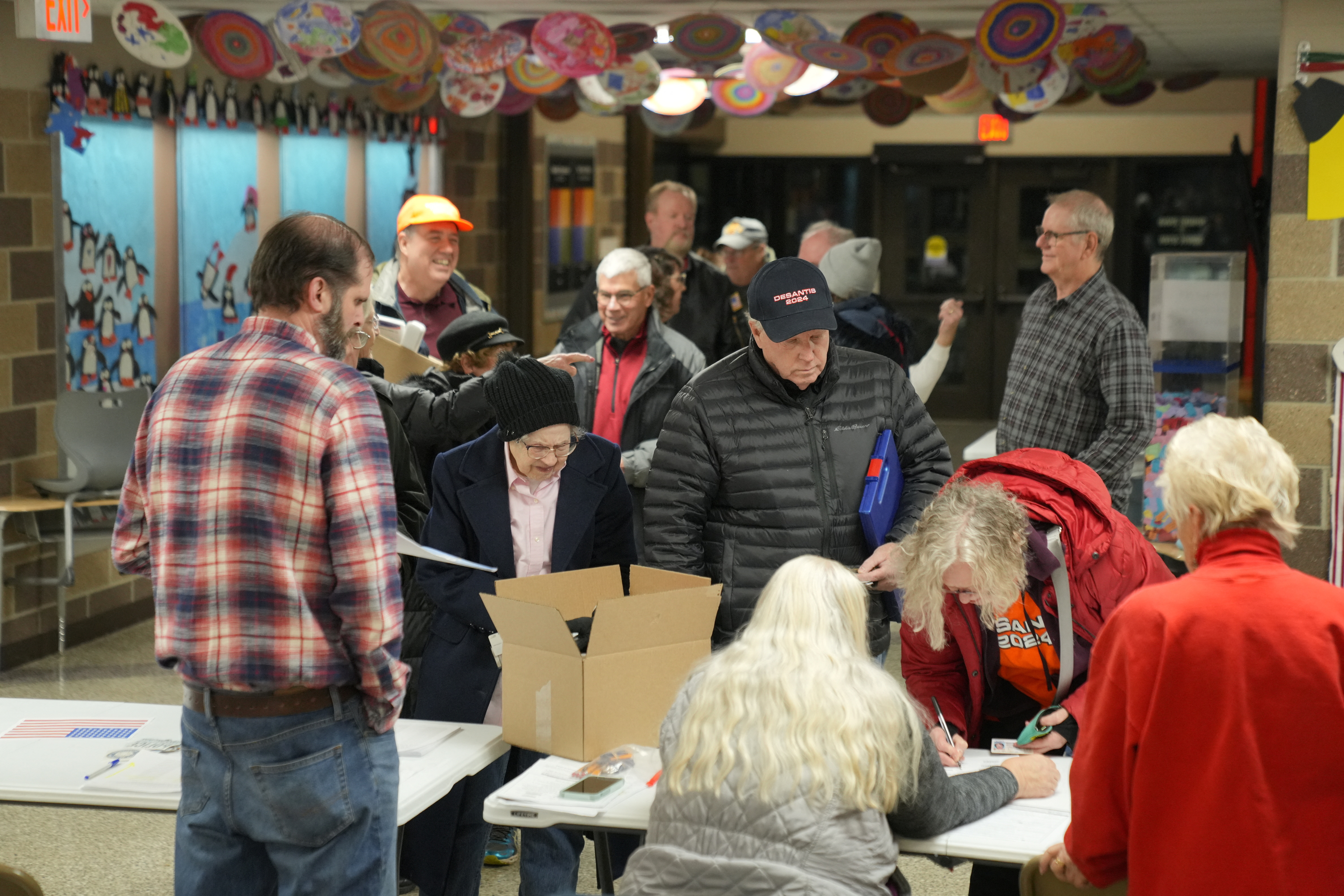By Gabriella Borter, Nathan Layne and Tim Reid, January 16, 2024 7:59 AM GMT+7
DES MOINES, Iowa, Jan 15 (Reuters) - Iowans braved frigid temperatures to gather at schools, community centers and other locations throughout the state on Monday for the first Republican nominating contest of the U.S. presidential election with Donald Trump favored to win big.
The former president's dominant position has turned Iowa's first-in-the-nation contest into a race for second place, as both Florida Governor Ron DeSantis and former U.N. Ambassador Nikki Haley aim to emerge as the chief alternative to Trump.
The Iowa contest, known as a caucus, got under way at 7 p.m. local time on Monday (0100 GMT on Tuesday).
Opinion polls show Trump enjoys broad support from Republican voters in the Midwestern rural state, even though he faces four criminal cases that could potentially land him in prison before the Nov. 5 election.
A survey of the first Republicans entering the caucuses found four in 10 saying immigration was the issue that mattered most in deciding who to support on Monday and four in 10 said the economy; the rest cited foreign policy or abortion, according to the entrance poll conducted by Edison Research.
The results are from the first people arriving at caucus sites, a group that might not be representative of all voters casting ballots on Monday.
A commanding victory for Trump in Iowa would bolster his argument that he is the only Republican candidate capable of taking on Democratic President Joe Biden.
"I'm hoping that it's a landslide, and I wouldn't be surprised," said Kim Pitts, 65, a retired Christian bookstore owner and Trump supporter.
A big Trump victory would spell trouble for his challengers, especially DeSantis, who has wagered his campaign on the Iowa caucus, barnstorming all of its 99 counties.
A third-place finish could prove fatal to DeSantis's prospects. Polls show him far behind Trump and Haley in the more moderate Northeastern state of New Hampshire, where Republicans will choose their nominee eight days from now.
Other contenders in the race include former biotech investor Vivek Ramaswamy, who stoked interest last year as a potential alternative to Trump but has failed to gain traction, as well as former Arkansas governor Asa Hutchinson.
Unlike a regular election, Iowa's caucus requires voters to gather in person in small groups, where they will cast secret ballots after speeches from campaign representatives. Results are expected several hours after the caucuses start.
Life-threatening frigid temperatures might convince some voters to stay home. The National Weather Service predicted the wind chill temperature could reach minus 45 degrees Fahrenheit (minus 43 degrees Celsius) in some parts of the state.
Trump's grip on his most loyal supporters may give him an edge.

People arrive at a caucus site at Fellows Elementary School as voters get ready to choose a Republican presidential candidate in Ames, Iowa, U.S. January 15, 2024. REUTERS/Cheney Orr Acquire Licensing Rights
"Trump is proven to get things done," said Austin Rasch, 30, a general contractor from Fort Dodge who predicted a strong turnout. "It's Iowa. We're used to cold."
Both DeSantis and Haley have expressed confidence they will exceed expectations in Iowa, though neither has predicted victory.
"If you’re willing to brave the cold and turn out for me, I'll be fighting for you for the next eight years, and we're going to turn this country around," DeSantis told a crowd earlier in the day in Sergeant Bluff.
At a diner in Des Moines, Haley predicted that other candidates will be forced to drop out in the weeks to come. "This will be a two-person race with me and Donald Trump," she told supporters.
Unlike his rivals, Trump did not attend campaign events, relying instead on surrogates to rally his supporters.
CROSSOVER VOTERS
One potential wild card: an unknown number of the state's Democratic voters have registered as Republicans to try to influence the caucus results.
"I just want to be able to look back and say I did what I could to keep Donald Trump from getting elected," said Toni Van Voorhis, 65, one such crossover voter, who plans to back Haley.
Iowa Democrats will not vote on Monday for their presidential nominees because the party has reshuffled its nominating calendar to put states with more diverse populations ahead of Iowa this year. They will cast their ballots by mail, with the results to be released in March.
There was a record turnout at the 2016 Republican caucus, with about 187,000 votes cast, or approximately 29% of the state's registered Republican voters. Republican turnout was closer to 18% in 2012.
Iowa has historically played an outsized role in presidential campaigns due to its early spot on the campaign calendar.
But the winner of Iowa's Republican caucuses did not go on to secure the nomination in the last three competitive contests in 2008, 2012 and 2016.
A political battleground that backed Democrat Barack Obama in 2008 and 2012, the state is now seen as reliably Republican in presidential elections as registered Republicans edge out Democrats.

Reuters Graphics
Source: Reuters